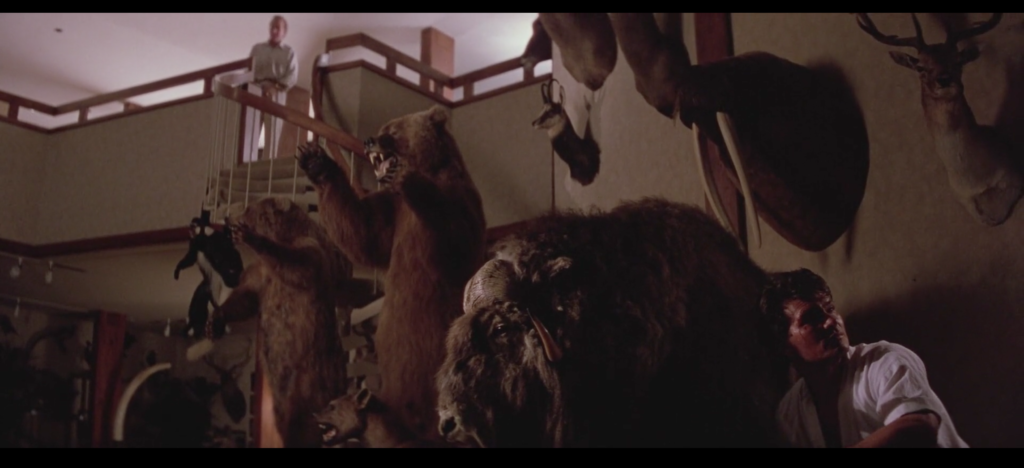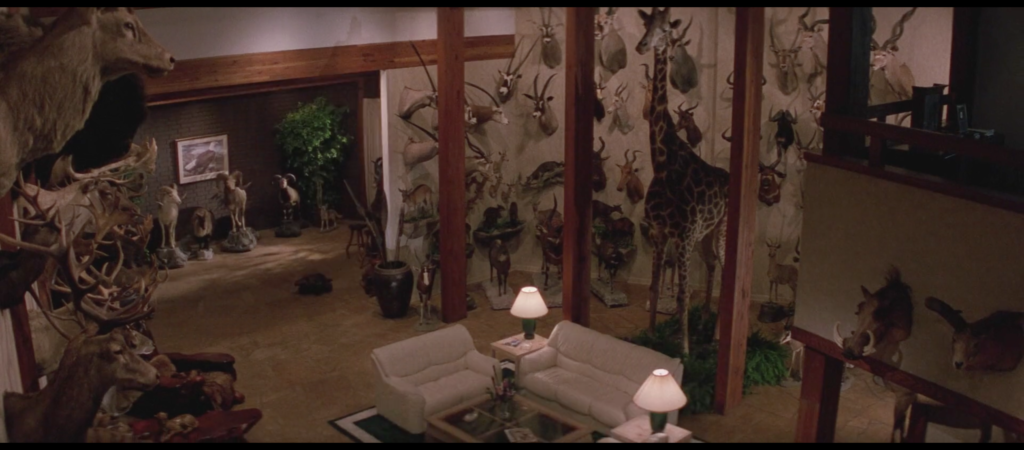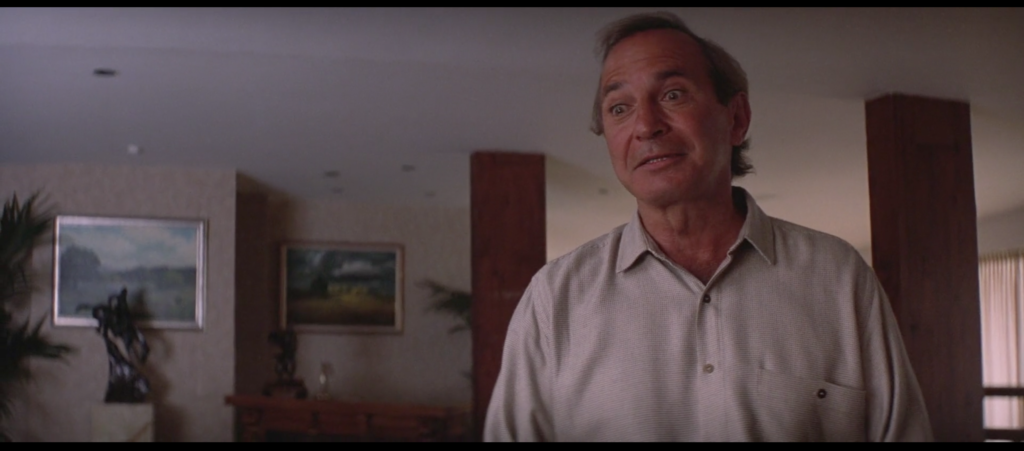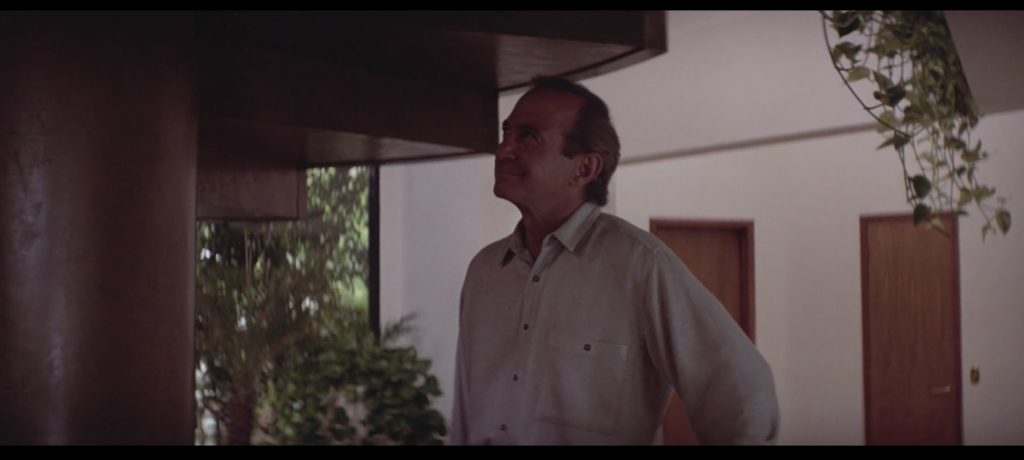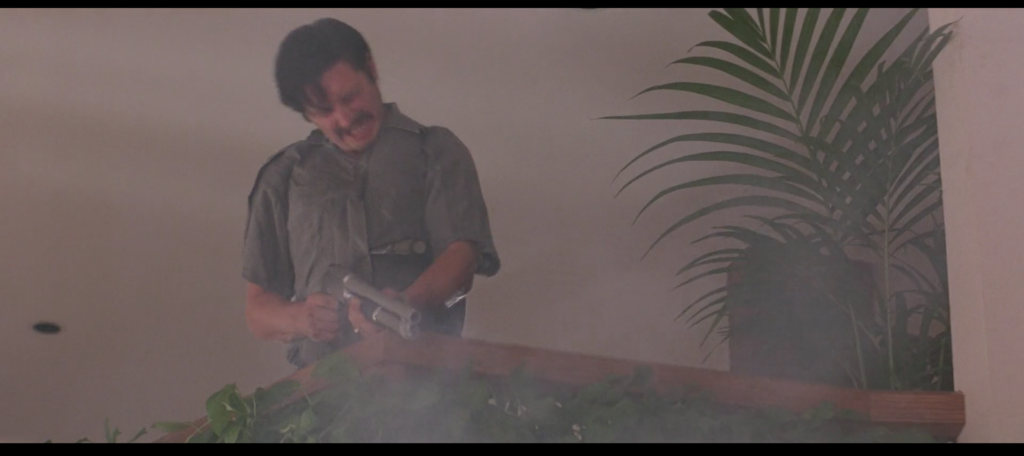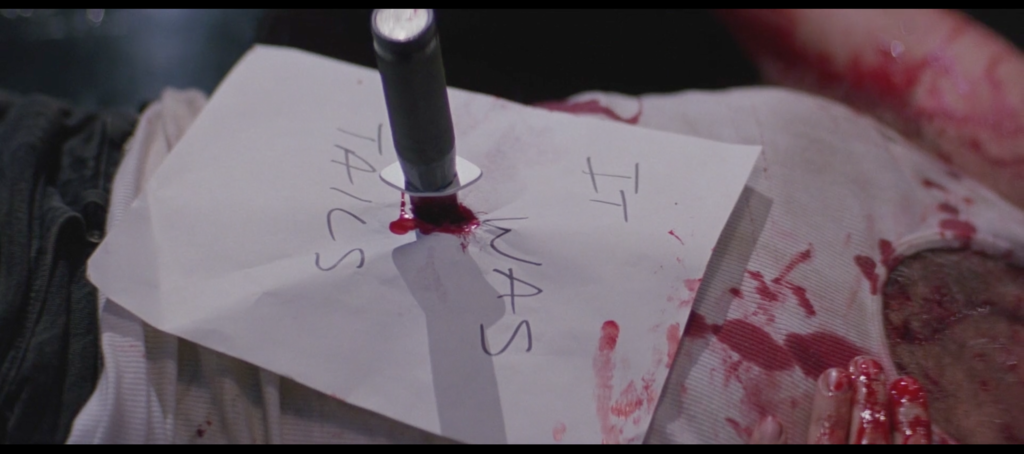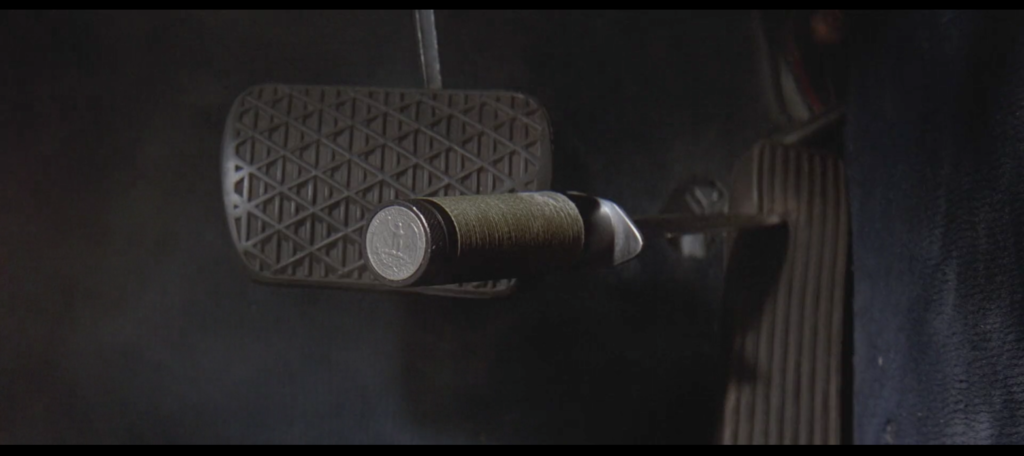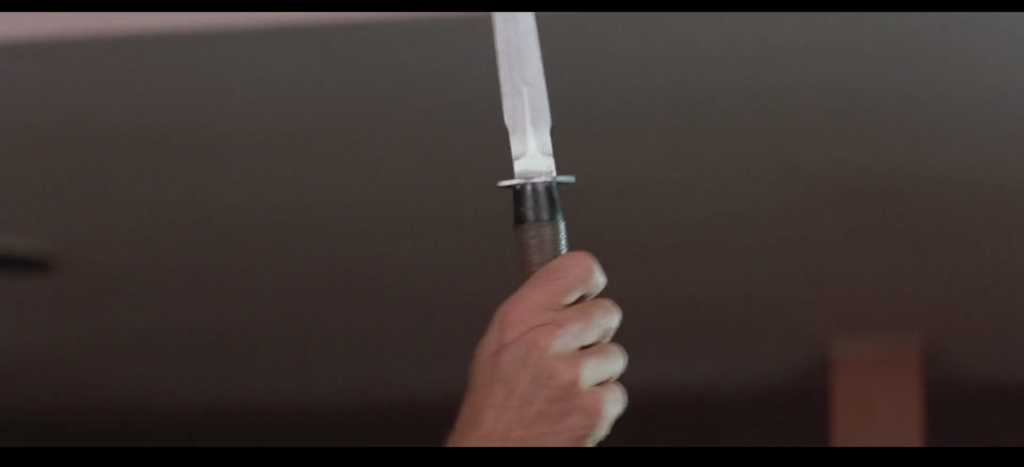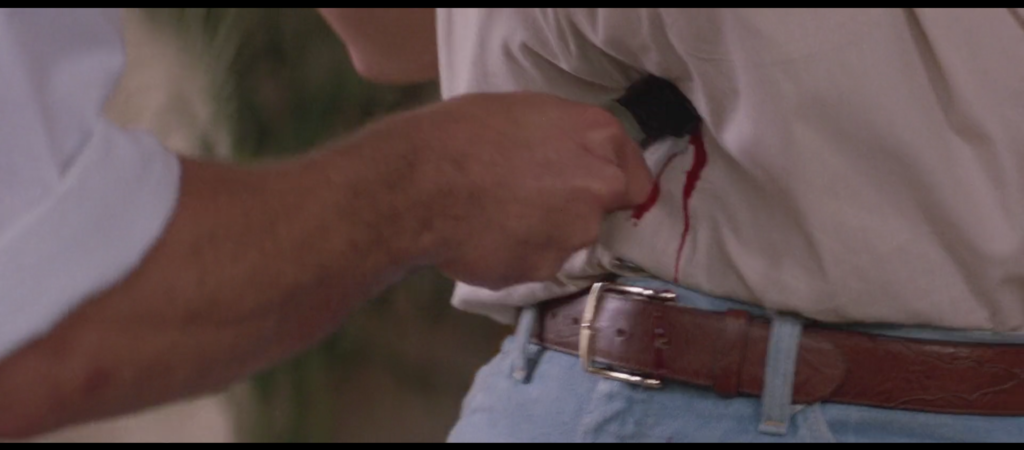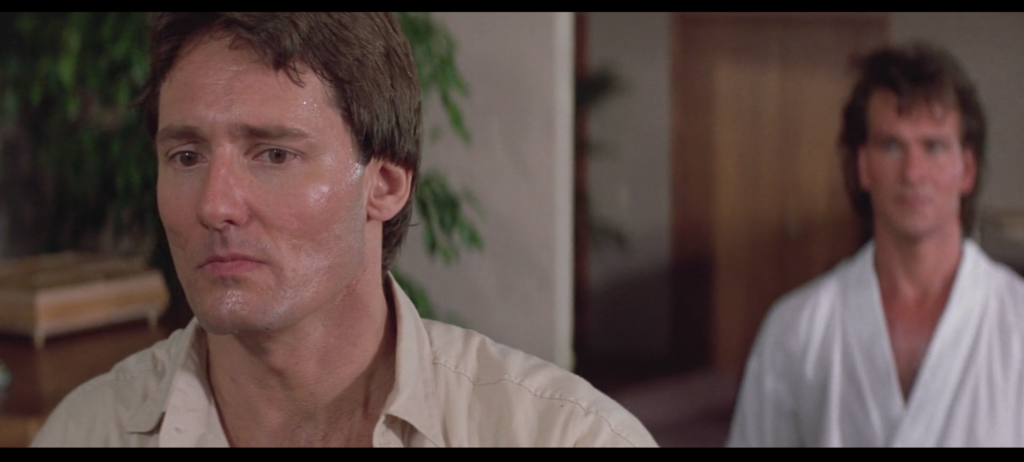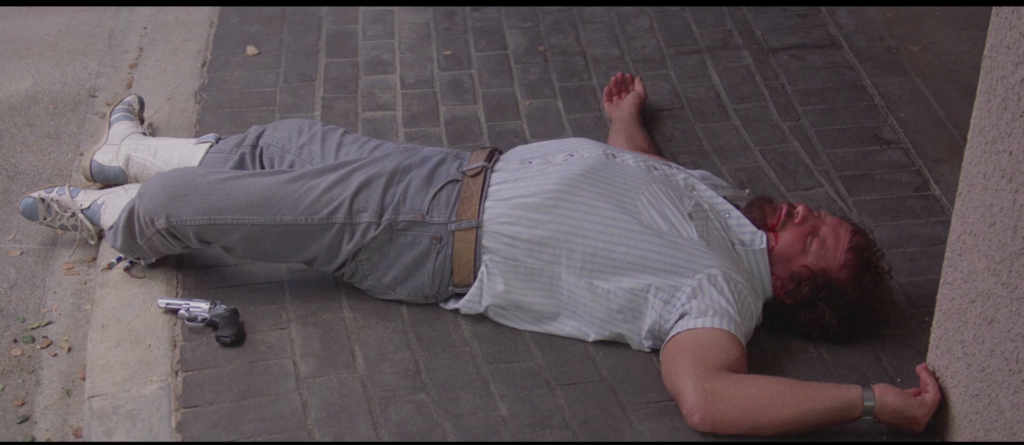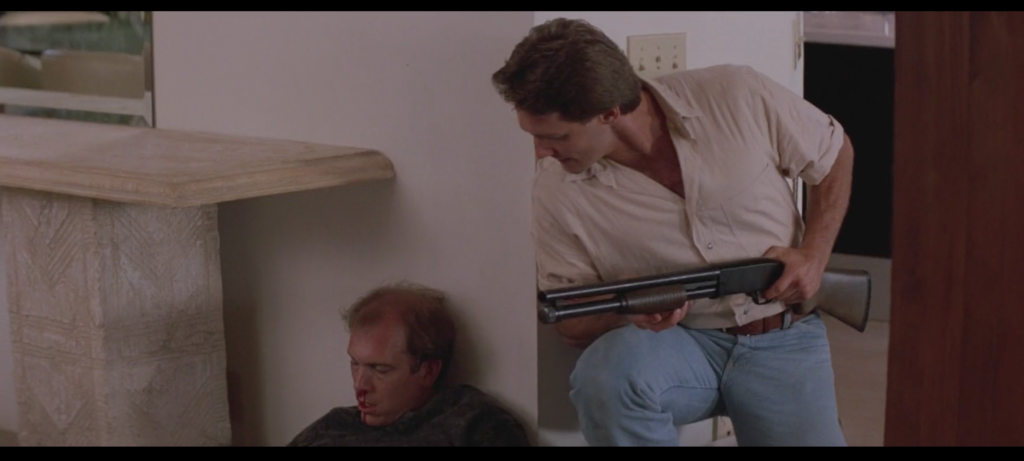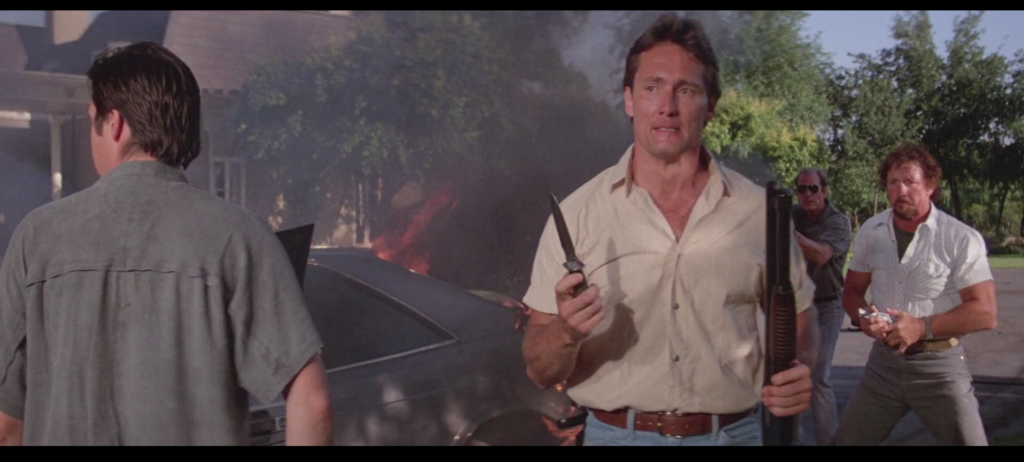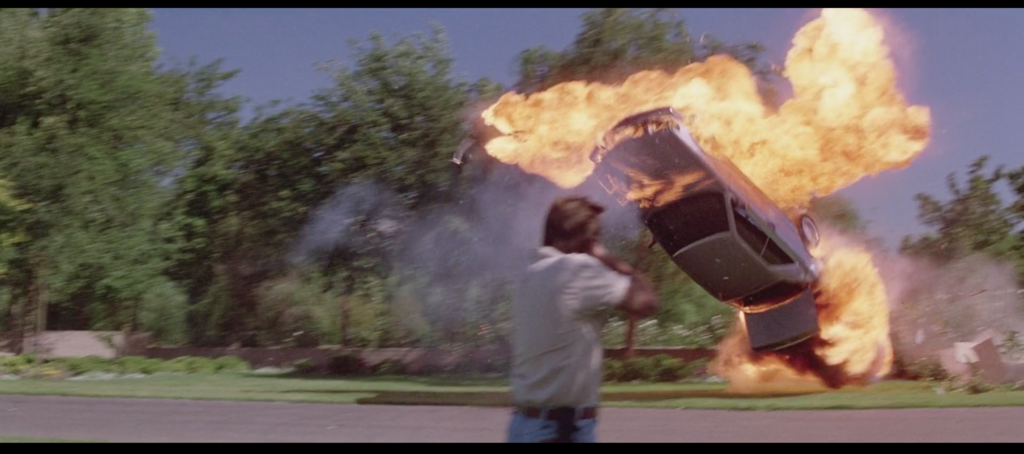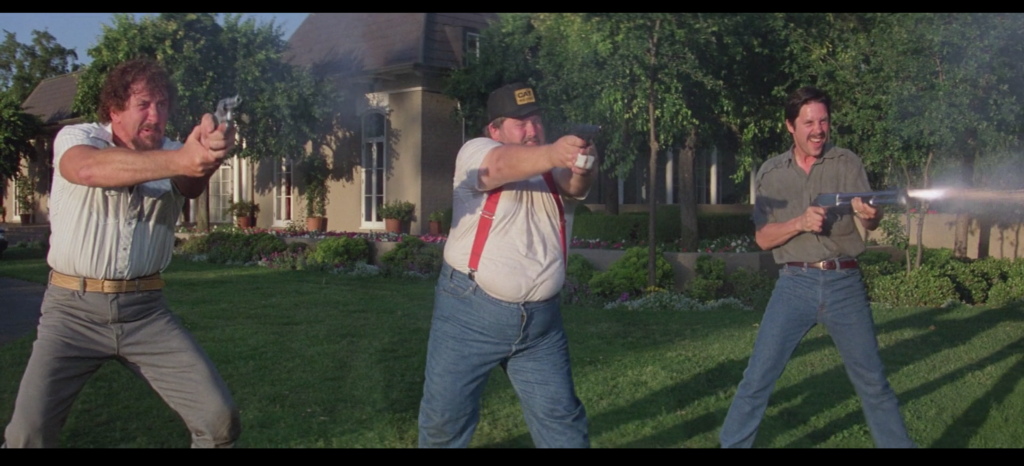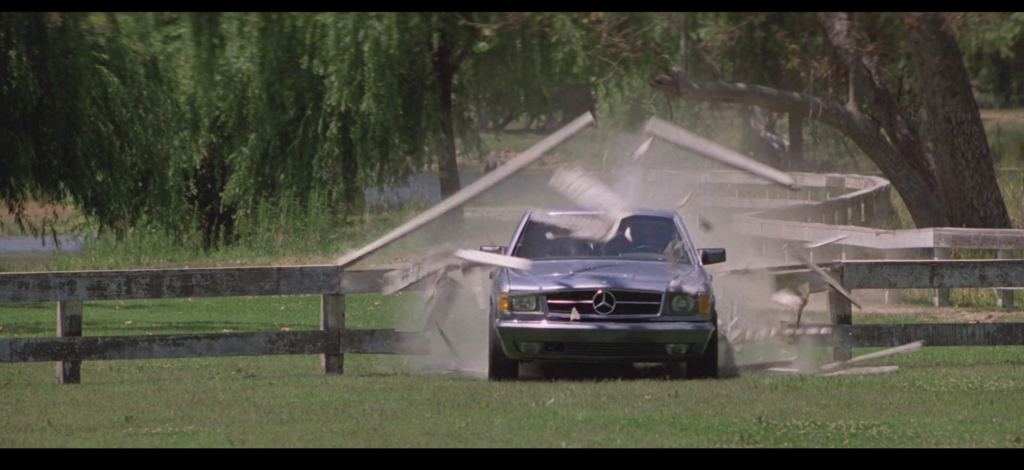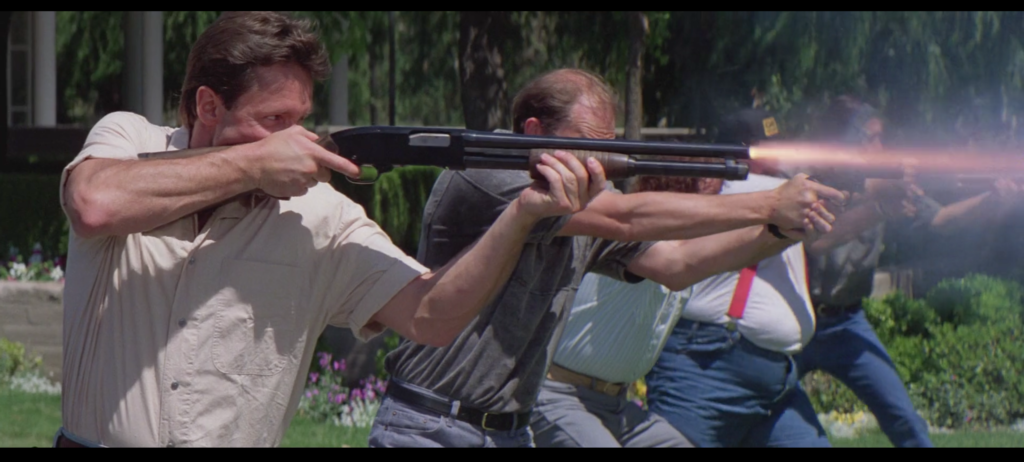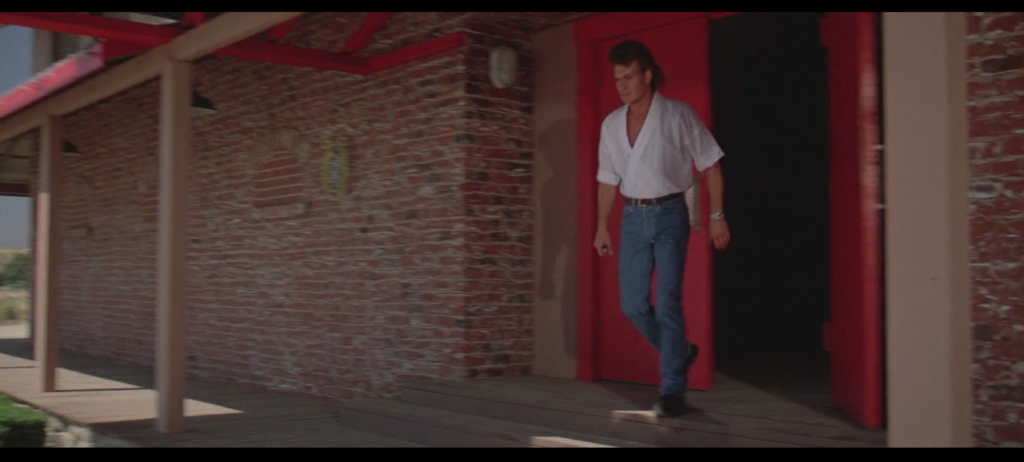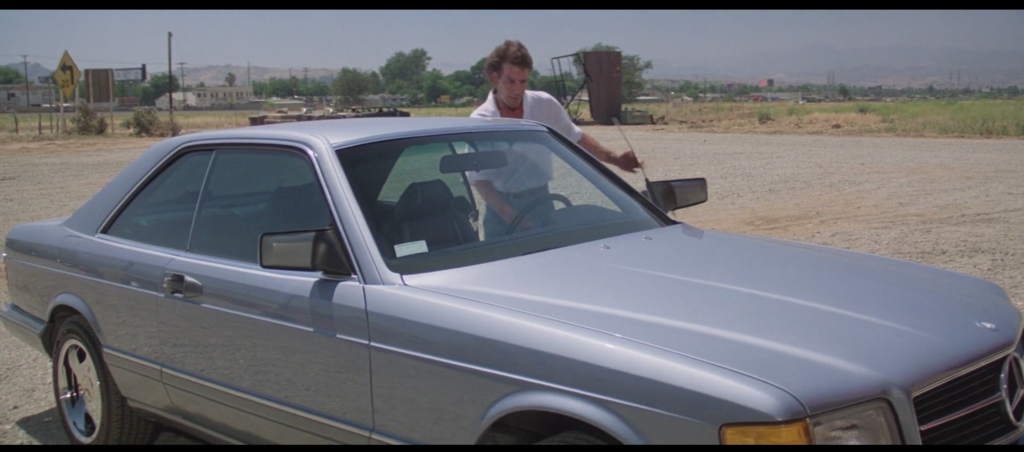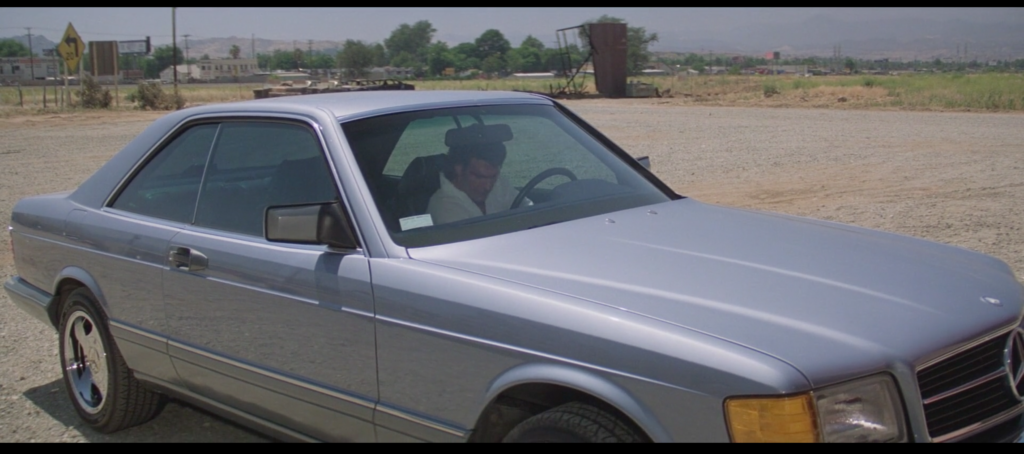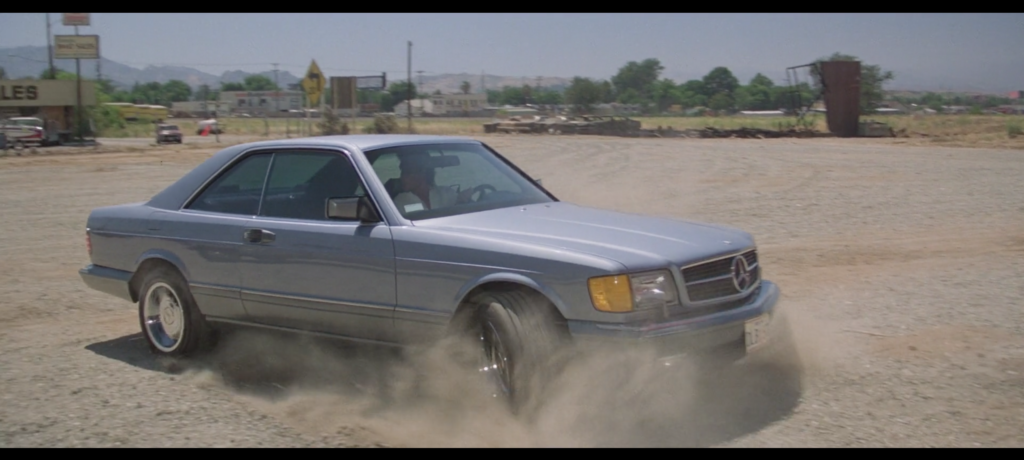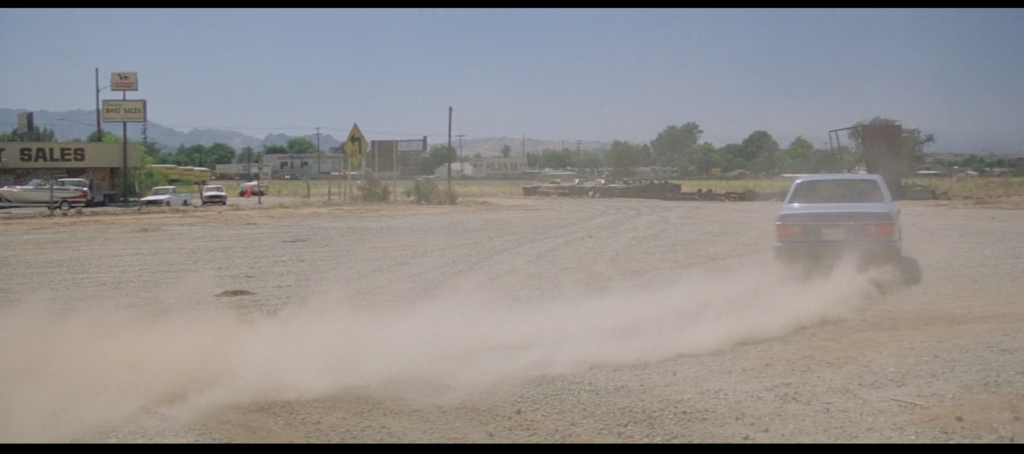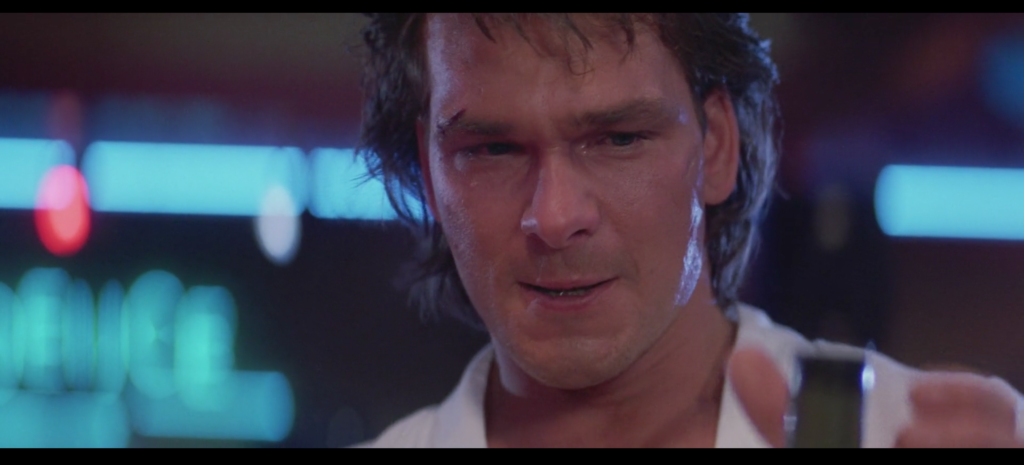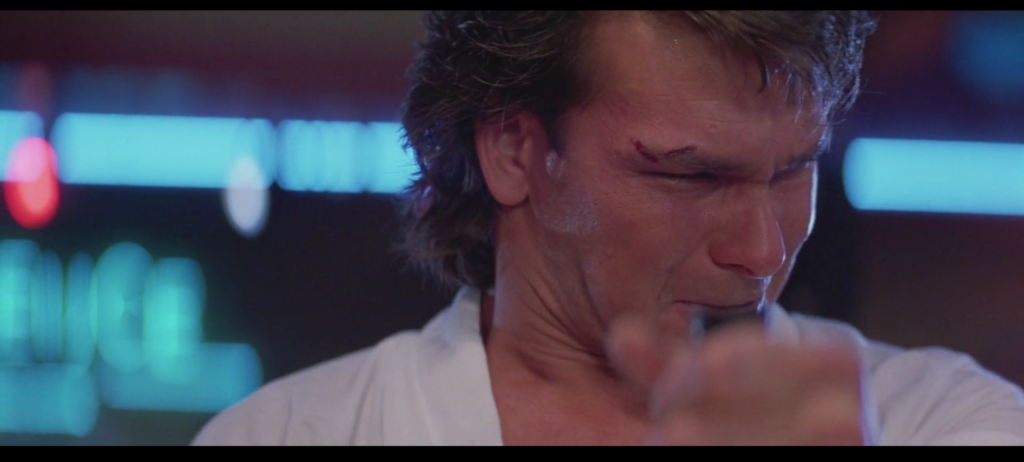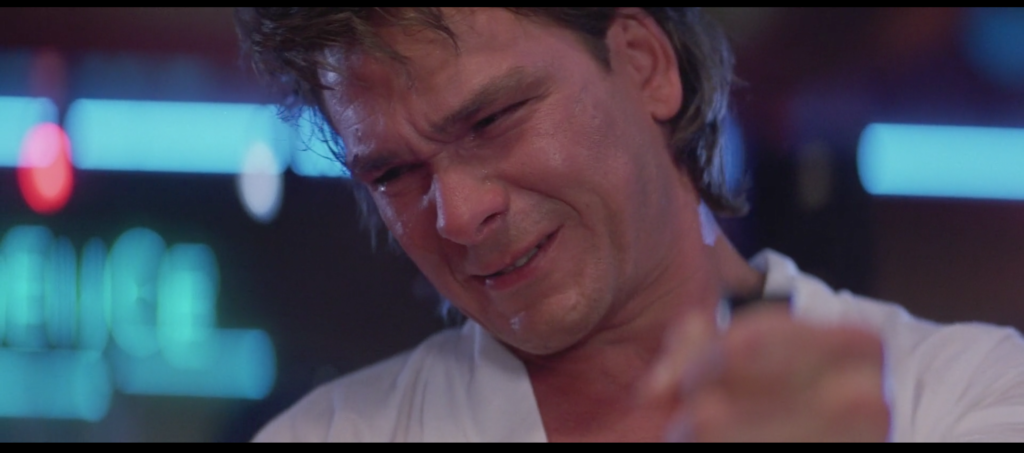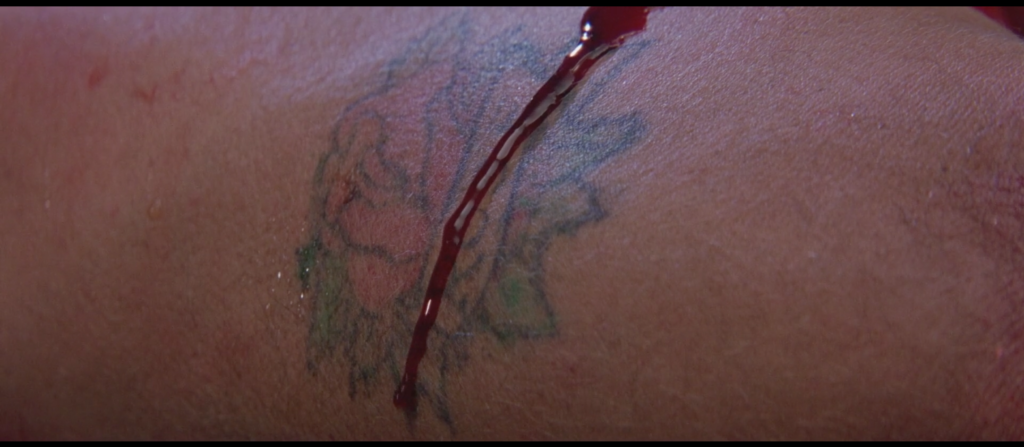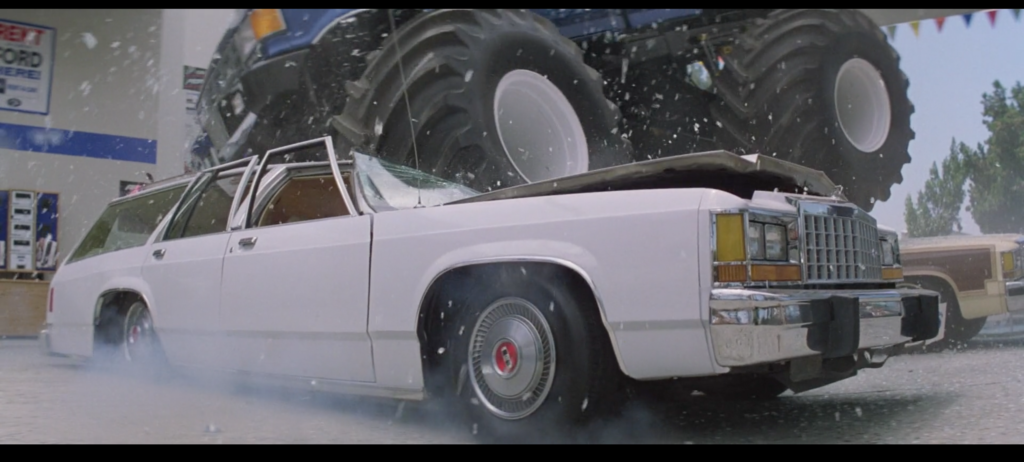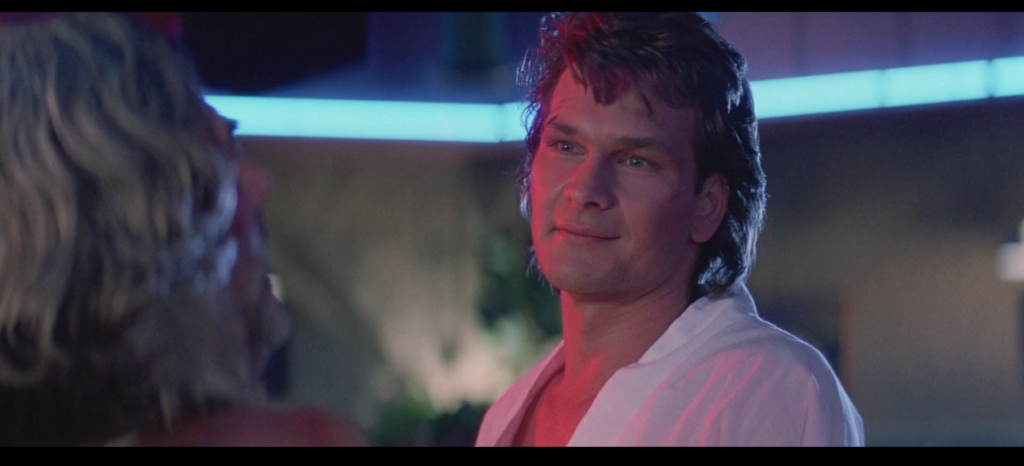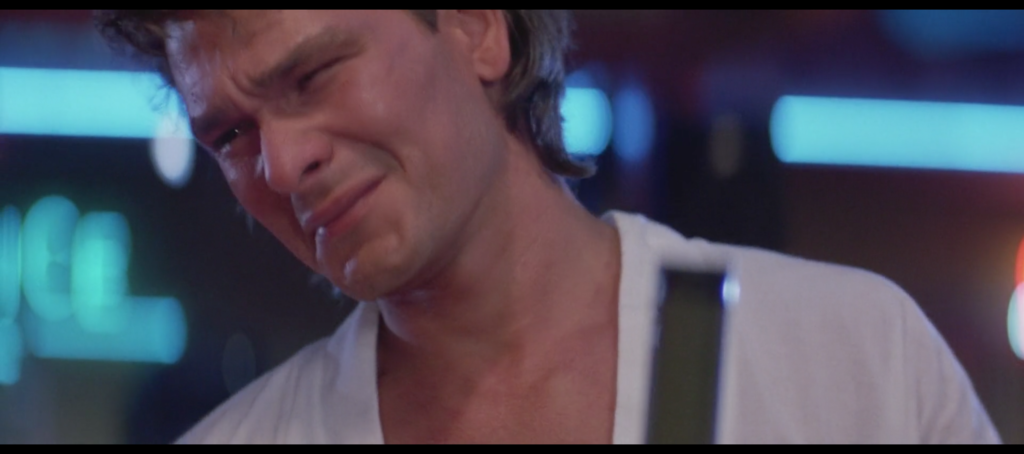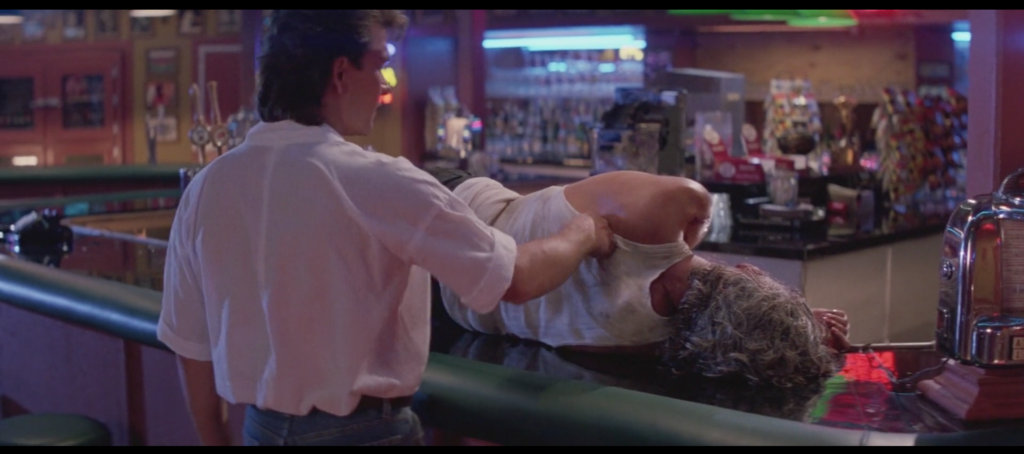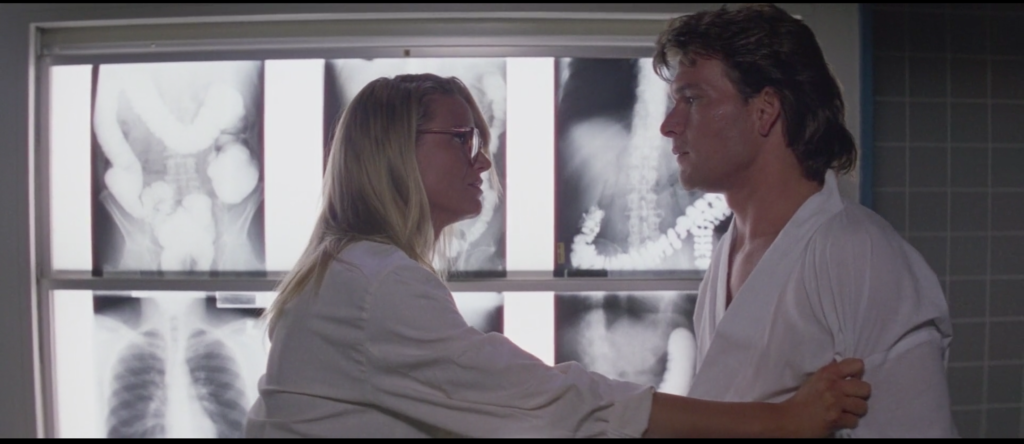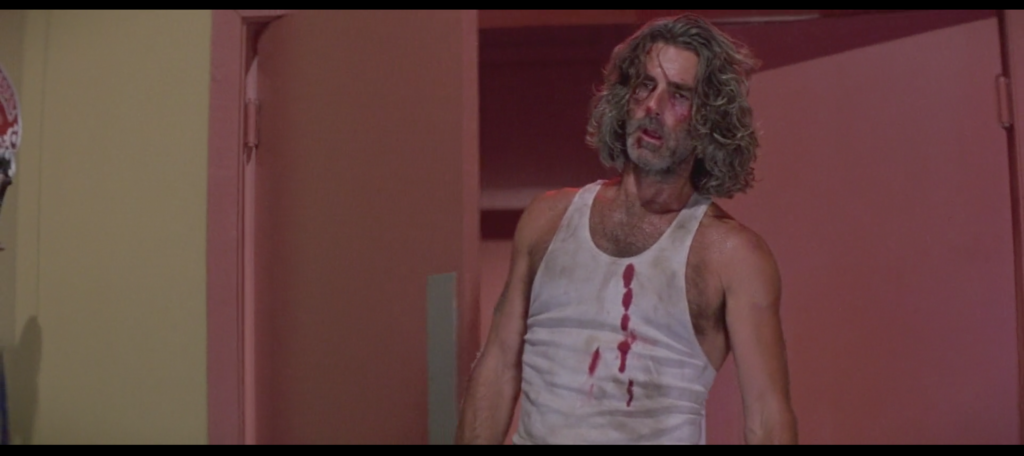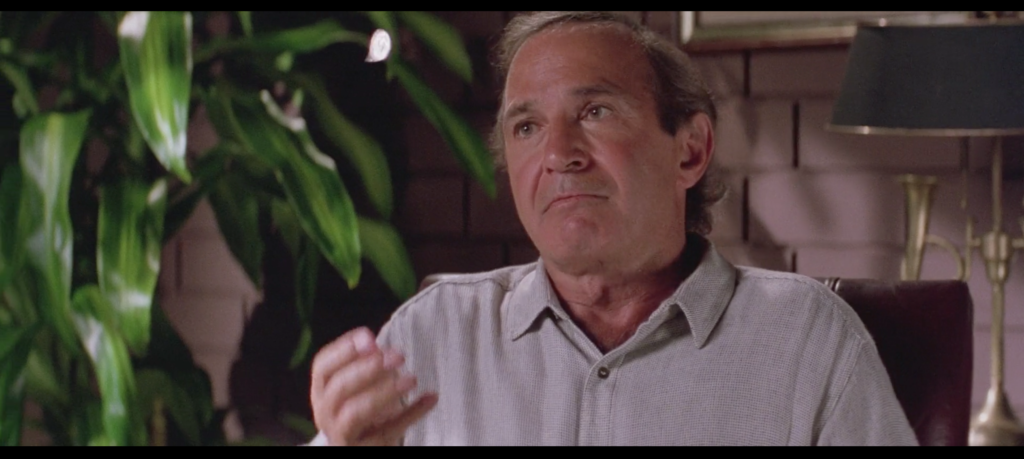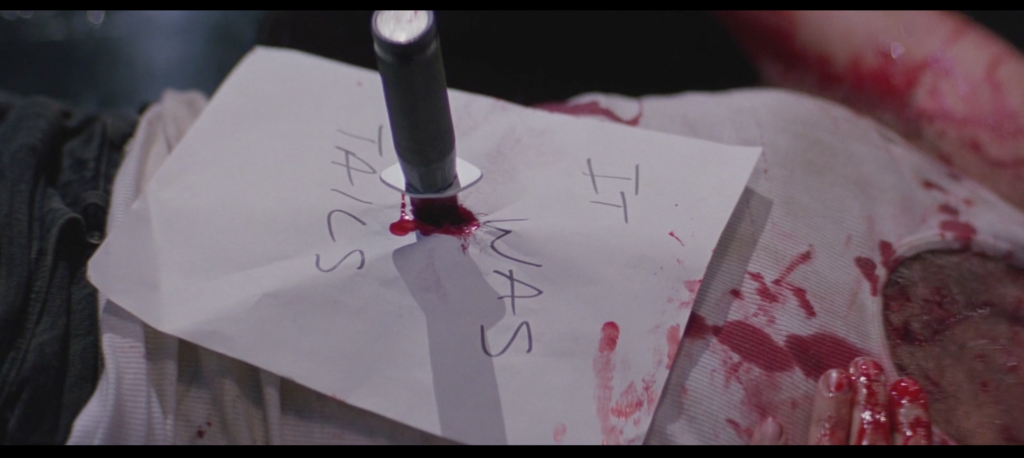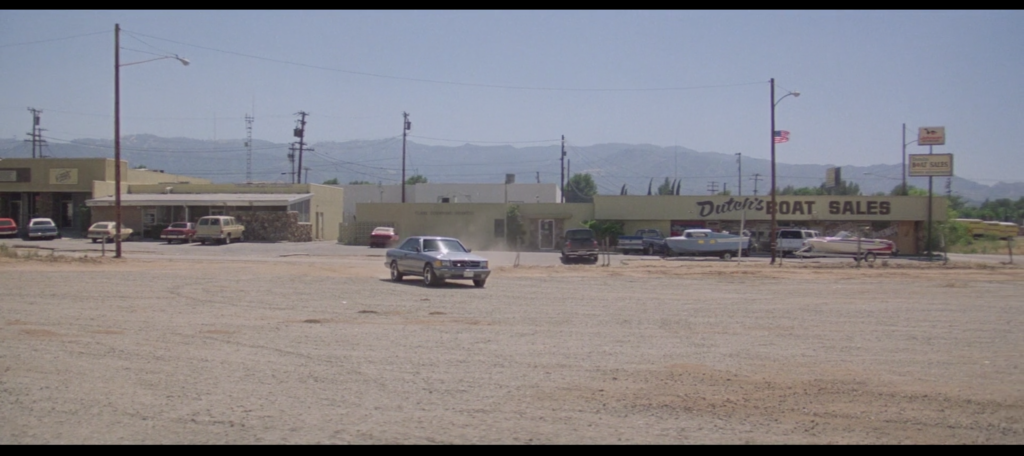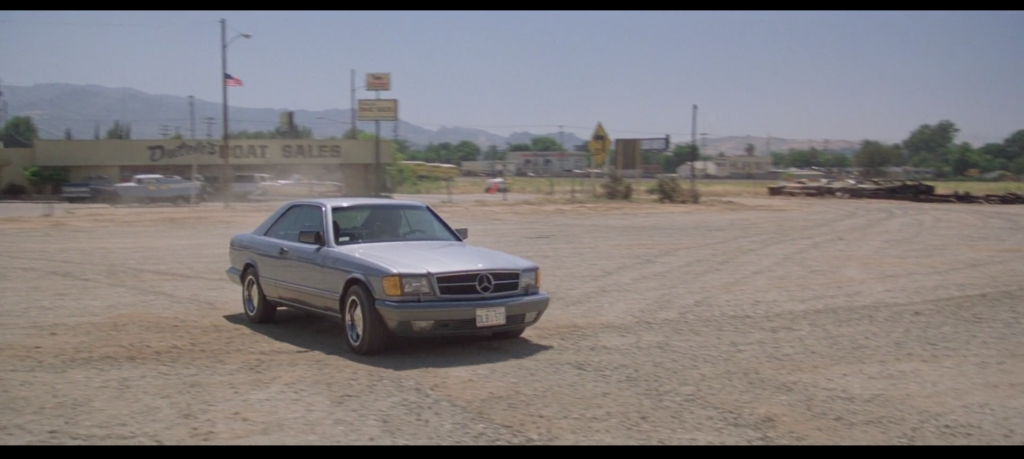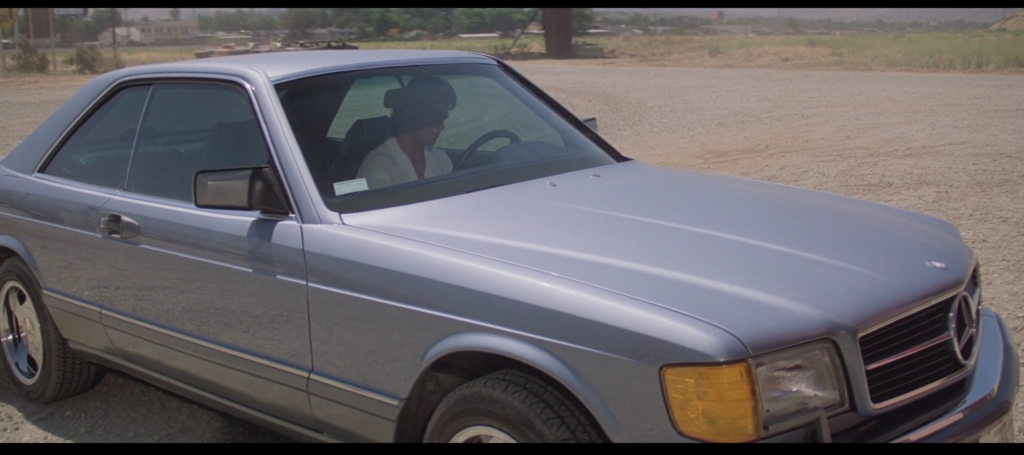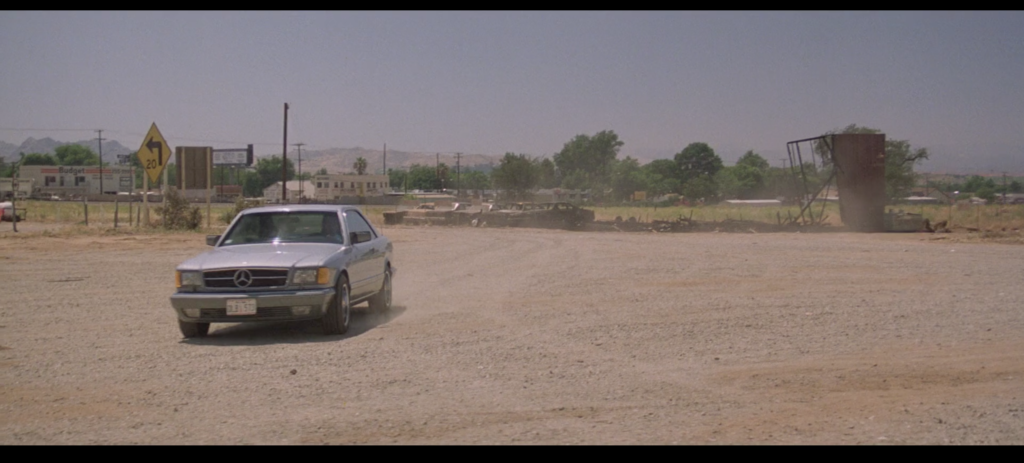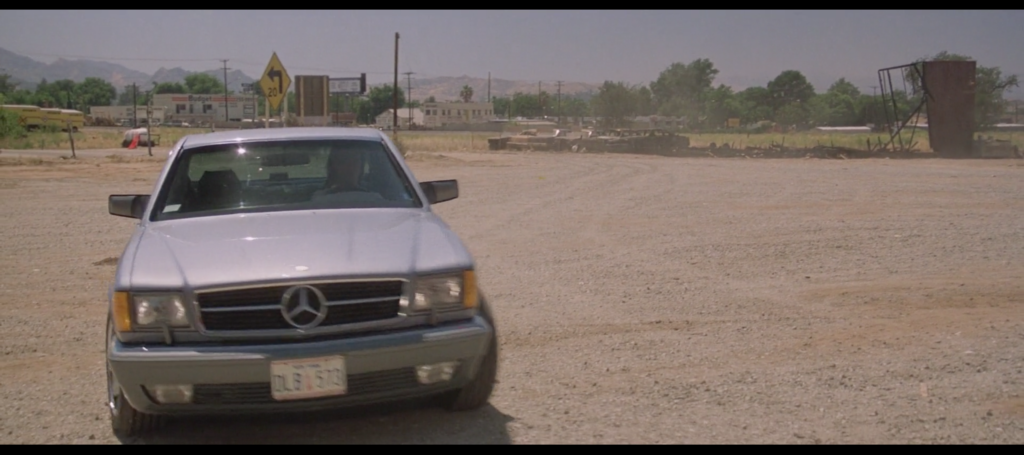Posts Tagged ‘road house’
337. Trophies
December 3, 2019“I see you’ve found my trophy room, Dalton,” Brad Wesley cries into the darkness. “The only thing that’s missing…is your ass.”
There is much to consider here, much to ponder, much to weigh to a nicety in the scales of our wisdom. First there is the trophy room itself, a genuinely obscene spectacle of severed heads and often entire animals, stuffed and mounted for the amusement of the man who murdered them. Put more simply, that’s a buffalo, that’s multiple bears, that’s a whole-ass giraffe in there. Brad Wesley shot and killed a giraffe, then had it shipped back home from safari and loaded, perhaps by the very goons whose corpses now join it, into his basement-level rumpus room. Dalton’s entrance into this forbidden chamber offers him one last and true glimpse of Brad Wesley’s mind. This is what the contents of the man’s brain look like: victims, always victims, always made to suffer and die, added to his personal collection of victories over those weaker, or worse armed, than himself.
Second there is Brad Wesley’s choice of words. The “trophy room” bit is easy enough to parse, as we’ve seen: Brad Wesley collects the dead bodies of his vanquished foes as keepsakes. But “the only thing that’s missing—” dot dot dot “—is your ass”? That is a giraffe of a different color.
Brad Wesley would hardly be the first man, or even like the fifth man, to sexualize his violent intentions toward Dalton by mentioning his body in such a way. (Arguably Jimmy would still be alive, and Dalton dead, had Jimmy refrained from the whole “I used to fuck guys like you in prison” thing and just snapped Dalton’s neck or whatever.) But there’s not even a double-entendre involved here in the sense that Brad Wesley is literally saying he’d like to have Dalton’s ass stuffed and mounted.
Not that way, no, of course he can’t possibly mean that way, not Brad Wesley. It’s just a figure of speech. The look of glee on his face when he says it, eyes widening, mouth stretching into a broad smile despite having witnessed the slaughter of his entire entourage? Just spoiling for a fight, no doubt. A few minutes later when he tries to impale and then beat Dalton with a spear? Mere coincidence that this was the only weapon to hand, I’m sure, nothing more to it than that.
But these are the stakes as we move toward the climactic confrontation, the final battle, The End of the Story. Brad Wesley wants to complete his trophy collection by stuffing and mounting Dalton’s ass. He said so himself. Wrestle with that.
335. You’re Never Fully Dressed Without a Smile
December 1, 2019Jimmy is dead. Morgan is dead. O’Connor is dead. Ketcham is dead. Pat McGurn is dead. Four corpses litter Brad Wesley’s mansion. And what is his response when he sees the men who risked their lives from him lying bloodied and mangled all around his house? How does he react when he sees O’Connor’s lifeless husk? He smiles. It’s the grin of a man thinking “If it’s not one thing, it’s another!” or “When it rains, it pours!” or “Ya gotta love it!” It takes a true sociopath to respond to mass murder not with horror or rage or resignation or even cold indifference, but with what Rifftrax’s Mike Nelson referred to as “wry amusement.” Ha! What a day, Brad Wesley thinks as he walks past one slain servant after another. Or as his enemy Red Webster once put it, That’s life. Who can explain it.
Of course, he never could stand a Bleeder, so there’s that too.
334. McGurned
November 30, 2019Technically speaking, Dalton is not the man who murders Ketcham, in the sense that he does not die instantly from being stabbed and carved in the guts. No, he’s still alive when Pat McGurn accidentally blows a hole in his back when Dalton pivots and uses Ketcham to block Pat’s incoming shot. Dalton then withdraws the knife from his dead foe’s belly and lobs it perfectly at Pat, where it lodges in his solar plexus, causing him to misfire his gun one last time before plummeting to the floor one story below and presumably breaking his neck, killing him. So ends the saga of the Sister-Son, the shiftless ex-lover of Frank Tilghman, the Man with the Weak Constitution, Patrick McGurn. And with him dies the instigating incident for the entire Dalton/Wesley War, the firing of Pat McGurn from his job of stealing from the register at the Double Deuce. He won’t be robbing registers ever again. Never again, the dulcet tones of Pat McGurn calling someone “chicken-dick.” Alas, alas, alas.
333. “Tails again”
November 29, 2019Brad Wesley may not seem like much of a details guy, considering how much of his business he delegates to his dubiously competent goon squad. But look at the butt of the knife that our good friend Gary Ketcham used to kill the already wounded and winded Wade Garrett. That’s a quarter, tails up—perhaps the very same quarter Brad Wesley flipped to decide whether to murder Wade or Dr. Elizabeth Clay. (Not that he communicated which person corresponded with heads or tails during the coin toss. See what I mean about how he doesn’t come across as much of a details guy?) Point is, this knife is always going to come up tails if used properly.
And use it properly Dalton does. When he gets the drop on Ketcham, he has just enough time to kick his shotgun and send his shot wild, then drop him to the floor. Ketcham reacts quickly, unsheathing his knife (which he’d recovered from Dalton’s car) and immediately adopting a knife-fighting stance. Showing steely resolve, Dalton dodges a few slashes, then kicks the knife out of Ketcham’s hands and straight up into the air. He grabs Ketcham, catches the knife after it makes its suspiciously leisurely descent, and jams it into his foe’s guts.
“Tails again,” he quips, and god help us, these are the last words Gary Ketcham will ever here. Imagine committing your life to a cause, in this case Brad Wesley’s control of a town full of old farts, and having that commitment lead you to a poetically just death, if by “poetically” you mean “on the level of a bathroom-wall limerick.” One needn’t like Katcham as a person in order to pity him.
332. Surprise!
November 28, 2019After discovering the dead bodies of Morgan and O’Connor, Ketcham makes an even bigger show of stealth than he had before. He’s all silently approaching corners and then turning with his shotgun at the ready, only to find an empty space where he’d thought to find Dalton. Then something—goon-sense?—tells him exactly where Dalton is: He’s right behind him.
The fight that ensues is swift and brutal and ends with two men dead, neither of whom is Dalton. You get the sense that at this point Dalton wants his enemies to see him coming. I mean, look at him back there, just standing and waiting, giving Ketcham a fighting chance. There’s no other explanation for Dalton allowing himself to be intercepted: He wants to look in this man’s eyes as the lights go out. Boo!
331. In Memoriam: Morgan and O’Connor
November 27, 2019Morgan was an important man, in the same sense that Brad Wesley’s grandfather was an important man: “He was an asshole.” Or as Carrie Ann put it, “Morgan was born an asshole and just grew bigger.” Here was a guy who was so temperamentally unsuited to the trade of bouncing that his presence actually made the old, hellhole version of the Double Deuce worse than it would have been had he not been there. Morgan had a great voice, a knack for off-kilter line readings (how can we forget “You’re a dead man“?), a penchant for tossing people through tables, and a thing for little moon boots. He’s gone now, murdered by Dalton, not even afforded the dignity of an onscreen death.
I can’t say he’ll be missed by many, because most of the people who might have missed him either are dead already or will be dead within minutes. One of those unfortunates is O’Connor, aka the Bleeder, the rumble-voiced dink who got his ass kicked by Dalton, then got his ass kicked by Brad Wesley for getting his ass kicked by Dalton, then got his ass kicked by Dalton and Wade Garrett in tandem. Then he, too, got killed by Dalton, offscreen, which—speaking as a general rule here—is not the place most movies want to kill their memorable goons. Road House is the exception that proves that particular rule.
And who is our guide through all this, our combination Charon and Virgil? It is Ketcham, the least memorable major goon, sneaking around Brad Wesley’s mansion looking for Dalton and finding only his handiwork. “Shit,” he says when he finds O’Connor slumped lifeless against the wall. That he was, Ketcham, that he was.
330. “Find that prick!”
November 26, 2019Ketcham—you remember Ketcham, don’t you?—is the one who puts it all together. It is he who investigates the thoroughly shot up and burned out wreck of Dalton’s car and discovers Dalton isn’t in it. (Surprise!) It is he who finds the knife pulled out of Wade Garrett’s chest and driven through the gas pedal to force the empty car to ram Brad Wesley’s compound. It is he who issues the four goons in his charge their marching orders: “Find that prick!” It is he who puts the knife back in his empty hip sheathe, revealing to the audience that it was he who put the knife in Wade Garrett’s chest. These climactic beats of the Road House story are pounded out by one man and one man alone.
Of course, and as this series has detailed, no one knows who the fuck Ketcham is when they first watch this film. Or when they seventh watch this film. Christ, before I wrote 140,000 words about Road House in daily increments I’m not sure even I realized the pivotal role this asshole played in several major events—driving his monster truck, lurking in the background of the Bleeder speech, spying on Dalton and Elizabeth from his monster truck, kicking Dalton with the boot-knife, running over Strodenmire Ford with his monster truck, killing Wade Garrett, and now, at the last, serving as the focal-point character for Brad Wesley’s goons unsuccessful attempt to find and eliminate Dalton. He genuinely is an important goon in this movie.
You just have no reason to believe that unless you’ve picked apart all the minutiae, is the thing. Importance is one thing, but do you remember him the way you remember the other four guys in this scene—Morgan, Pat McGurn, Tinker, and O’Connor, aka Terry Funk, John Doe, the funny overweight one, and the Bleeder? Of course you don’t, and why would you? They’ve looked and acted memorably. Ketcham might as well be a mannequin performing his tasks. You don’t even get to see him drive the knife into Wade, which might cement him as Jimmy Junior, so to speak. He’s just a stuffed shirt with a boring look and no preexisting connections to the Double Deuce by which to remember him.
Yet he will be the central goon in the carnage to come. Find that prick? My friends, we’ve already found him.
329. Death of the dream
November 25, 2019Dalton’s Mercedes-Benz represents the freedom afforded him by his life as North America’s second-best bouncer. It is the only ostentatious display of his considerable wealth. It is the vehicle he uses to travel from one town to the next, never tied down. It is the secret self he hides from his employers and antagonists alike, safe in a garage or under a tarp as his latest hoopty serves as its whipping boy.
So it means something when Dalton jams a knife through the gas pedal, pinning it to the floor, and lets the car loose in the goons’ general direction. It means something when it hits some kind of natural earth ramp and leaps above a low brick fence into the air, sustaining fire all the way. It means something when it detonates and bursts into huge gouts of flame, an explosion that means as much to Dalton’s lifestyle as the explosion of Red’s Auto Parts meant to Red Webster or Emmett’s house meant to Emmett.
Dalton’s way of doing things is over, it’s finished. It died with his car, consumed by its flames. The only question now is what will rise from the ashes.
328. The Apotheosis of Pat
November 24, 2019Pat McGurn is weak. His uncle, his only mother’s brother, Brad Wesley, says so himself: “Pat’s got a weak constitution, you boys know that. That’s why he’s working as a bartender. He’s my only sister’s son, and if he doesn’t have me who’s he got? And if I’m not there, you’re there.” An entire ecosystem of goonsmanship, formed to protect Pat McGurn from the vicissitudes of the mad mad mad mad world outside Brad Wesley’s mansion. Pat may show some sand every once in a while, like when he pulled a knife the size of a newborn baby on Dalton and tried to murder him in front of several witnesses while calling him “chicken-dick,” but in general he’s just the loser who got fired for skimming the till. It’s enough to make you wonder what his former lover Frank Tilghman saw in the guy.
But not here, not now, not with Dalton’s car barreling down on him. Here we see a whole new side of Pat McGurn, a gangly grinning gun-toting side. Look at that shit-eating smile! He pumps that shotgun with a boogie-woogie rhythm in his hips, like he’s mentally saying “yee-haw!” or playing “Rock This Town” by the Stray Cats. Maybe this is just the default setting for actor John Doe, who after all was the frontman for the Los Angeles punk act X. This is Pat McGurn taking the stage and rocking Dalton’s car’s face off. Sadly—sadly for Pat, at least—his performance is about to be cut short.
327. Goons vs. Car
November 23, 2019After three star turns in under five minutes, Dalton’s car finally has its first fight scene. First and last, sad to say. It barrels towards Brad Wesley’s mansion at breakneck speed, plowing right through a fence and over a hedge to its appointment with destiny. Arrayed against it are Wesley’s five core goons who are a) alive and b) not Karpis—Ketchum, O’Connor the Bleeder, Morgan, Tinker, and Pat McGurn. There’s no jaw-jacking involved here. It’s on sight. They open fire with an array of shotguns and handguns—all of which raise the question of why they bothered with the fistfighting and knife-fighting in the first place. They certainly don’t hesitate to shoot Dalton’s Benz, and (they assume) Dalton himself, full of lead. Was it Jimmy’s death that lifted the shibboleth against straight-up murder by gunfire? Did Dalton bring this fusillade upon himself? Or at the very least on his car?
326. And now: Un-Parking
November 22, 2019I know what you’re thinking. “We’ve already seen Dalton park his car in the same spot twice in three minutes. Do we really need to see him leave that parking space, too? Do we need three instances of him pulling into or pulling out of a parking spot in five minutes total?” Define need, I suppose is the best response here. For one reason or another Road House decided it is of paramount importance that we see Dalton getting into and out of this car over and over and over again. There’s at least one storytelling reason for this that makes some kind of sense, as you’ll soon see. I’m not sure if there’s really sense to be made, but I’m open to the possibility. I’m even open to the idea that it’s the film’s way of showing how even in the face of danger and tragedy, the drudgery of everyday life continues. If you’re off to avenge the death of your mentor at the hands of the minions of a berserk Chamber of Commerce luminary, guess what? You’ve still gotta drive there.
325. Rose
November 21, 2019The idea comes to him fast, and he acts on it just as suddenly. There’s a knife sticking out of the chest of his mentor and best friend. The knife has to come out at some point. Perhaps it’s best, perhaps it’s right, that he remove the knife himself, that he wield that knife against the perpetrators of this horrible crime. So he steels himself. He breathes deep and exhales through his closed lips. He puts his hand on the hilt. He shifts his gaze from the knife to the face of his slain friend and back again. All the while he grips and pulls, pulls, pulls. The camera cuts away as if to spare us the intimate sight of Dalton pulling the penetrator out of the body of Wade Garrett, the most famous bouncer in all of Christendom, the man who made him the man he is today. All we see is the thin trickle of blood that flows over Wade Garrett’s rose tattoo. In interviews it is canon-established that Rose was the name of the woman who gave him his favorite scar, on his hip, inches from his pubis. A permanent tribute to the glory of sex, stained in this final hour by the plain fact of violence. This is the end of the road for Wade Garrett, but the knife that pierced him will plunge into another body before the day is done. To Dalton, that much is clear.
324. Interlude
November 20, 2019It’s been getting kind of heavy around here, what with all the death and the crying and what have you. Fortunately Road House remains Road House at all times and in all ways. Everything that’s happening in Road House is happening simultaneously—the throat rip and the parking scenes and the Sharing Husband and the breakfast scene and the sex scene and the Giving of the Rules and, of course, the monster truck running over a Ford dealership. They’re all as close to you as your copy of the movie, and with the flick of a button you can be anywhere and everywhere within Road House at once. It exists in all states. So here, have a shot I stumbled upon completely at random today of the wheels of a monster truck absolutely demolishing a station wagon. Let it smoosh the sadness and the fear and the anxiety right out of you, let it send them flying out of your body in thousands of jagged shards. Be the truck. Be the wagon. Be Wagon Days now.
323. Sublime/Faces of Death Redux
November 19, 2019I sometimes think of Road House as a sublime movie, and that’s not an adjective I throw around for movies that often. For me it’s reserved for films that transport me into a place of tangible, physical awe—the equivalent of musical frisson, that chill you get up and down your spine and through your skull from art that stuns you. If you know me at all it won’t surprise you to learn that I get this feeling most often from horror films. I think Jaws is sublime. I think The Exorcist is sublime. I think The Shining is sublime. I think Aliens is sublime. I think Hereditary is sublime. I think Barton Fink is sublime. You get the idea. So you get that Road House does not transport me the way any of those movies do.
Why is Road House sublime? Because sandwiched in between two identical parking scenes and a scene in which two lovers confront one another over matters of life and death in front of a bunch of x-rays of people’s colons, Patrick Swayze looks at Sam Elliot like he does above and below. First: total love, respect, humility—he is admitting he was wrong after all—and above all gratitude that he gets to know this man. Then: total loss, grief, anger, denial, anything but acceptance that this man who meant so much to him is gone.
The word I use to describe Patrick Swayze as an actor is generous. He gave himself over to this absurd role in this absurd film, used every ounce of his training as an actor and a professional-grade stuntman and a professional-grade ballet dancer. Every interview I’ve ever seen with Kelly Lynch or Marshall Teague or Sam Elliott in which they’re asked about this film is full of superlatives of how dedicated he was, and how kind he was, and how the experience of working with him was…well, they don’t say it, but I will: sublime.
Parking, acting, colons, parking, more acting, acting like his life has fallen apart, like the person he loves most in the world has been stolen from him. His eyes squint with tears and she shakes his head wildly back and forth, moving his whole upper body at one point, his whole self one gigantic No. Some of the dumbest filmmaking I’ve ever seen, and then this. Sublime.
322. “Yo! Wake the fuck up!”
November 18, 2019“Sit the fuck down, have a beer, I’ll be back,” Dalton said to Wade just before departing to find Elizabeth. “Wesley wins, man. We’re outta here.” It’s then that Wade shoots him the “Attaboy, mijo” he will no doubt return to in his mind for years, even decades, to come. They’re just two men being men, swearing when it isn’t necessary, patting each other on the back. It’s who they are, even when one of them has been beaten half to death.
Dalton attempts to return to this pattern of dialogue when he comes back to the Double Deuce after his failure with the Doc. “Yo! Wake the fuck up! We’re outta here!” he says from across the room, smiling. This has alway struck me as the one genuinely superfluous f-bomb in the whole profane film. “Wake the fuck up” right away, without even a normal “wake up” first? It feels forced.
And it probably is. After all, in the guise of going along with his mentor’s wishes, Dalton is admitting to two massive failures: first, his failure to free the town of Jasper from Brad Wesley’s clutches, and second, his failure to convince Elizabeth to retreat alongside him. A nice blustery “fuck” where no “fuck” need be will paper over all of that just fine—indeed, it’s probably necessary to offset the repetition of “we’re outta here” from their previous conversation. Getting “outta here” is an admission of defeat, and that needs amelioration. The little friendly punch to the back Dalton gives Wade afterwards is of a piece with the cussword. Just guys bein’ dudes.
It falls apart quickly, though. “I said ‘one beer,’ señor,” Dalton says, still grinning, as he puts his hand on Wade’s arm to shake him awake. But there will be no awakening Wade Garrett, not now, not ever again.
321. X-rays
November 17, 2019When Dalton bursts into the hospital room where the Doc is working in order to whisk her out of town with him, she’s looking at x-rays of people’s colons and whatnot. Why? She stitches up knife wounds for patients who come to the ER. Does she do that and gastrointestinal stuff? Maybe she’s just curious? Maybe—spitballing here—the props department just said “get me a bunch of x-ray stuff” and this is what they came up with. Broken legs, bullet wounds, anything would have worked better than what they wound up with. It makes for a uniquely mood-killing backdrop for Dalton and Elizabeth’s conversation, which is really more of a confrontation: He demands that she leave with him, bodily yanks her out of her seat in fact, and she tells him no because as best she can tell he’s just as crazy as Brad Wesley, so he gives up and leaves. If these colons could talk, man, if these colons could talk.
320. Wounded Wade
November 16, 2019No sooner does Brad Wesley hang up on Dalton than Wade Garrett stumbles into the Double Deuce, wounded and winded. He’s not dead, not yet anyway, and it’s unclear whether the beating he says he sustained at the hands of three unnamed goons—none of which are members of the core team, who we will soon get a good look at and none of whom are injured in the slightest—is part of the coin-toss murder scheme Wesley just unveiled. Dalton certainly thinks it is, though: Since Wade isn’t dead, it stands to reason that Elizabeth is in grave danger, and indeed Wade says his assailants told him he was lucky. Dalton bounces out of there as quickly as he can, but not before telling Wade that Wesley wins, that they’re all going to skip town. “Attaboy, mijo,” Wade says, grinning. It’s the last thing Wade will ever say to him.
My own mentor, Tom Spurgeon, died this week. He was too young to go. The last thing he said to me was “Your writing is important to me!” So I can say, based on personal experience, that that “Attaboy, mijo” will lodge itself in Dalton’s heart. It’s there to stay.
319. Coin toss
November 15, 2019What’s the most you ever lost on a coin toss? This is not an idle question pretty much any time it gets asked. It’s certainly not for Dalton. Upon arriving at the Double Deuce to tender his resignation, he is greeted by a phone call from Brad Wesley. “Top o’ the mornin’ to ya!” the deranged JC Penney franchisee says, before telling Dalton “what’s on for today”: “Wade, or Elizabeth…one of them dies.” Dalton has no response but to tell Wesley “you’re a sick man,” his voice echoing Morgan telling him “you’re a dead man” lo those many moons ago. So, in the absence of Dalton expressing a preference, Brad Wesley flips a coin. He looks at the result, gets back on the phone, and says “Dalton, I’d sure like to tell you how it turned out.”
This is how it turned out:
It’s hard to see what with the corpse of Wade Garrett obscuring it, but there’s a point I’m making here: At no time during or after their conversation does Brad Wesley say anything like “Heads for Elizabeth, tails for Wade.” He doesn’t even list them in that order! The information in the note above is a point of interest, I suppose, but since Dalton was given no frame of reference for the coin toss it might as well say “It was heads” or “It was Option C” or the text of the Gettysburg Address. The point of a supervillain coin toss is to tell you what the options are and then let the coin fall where it may, not to do all of this in secrecy and only reveal the results when they mean nothing to the person to whom you’re revealing them.
Unless you’re the supervillain in Road House, in which case all bets are off. Brad Wesley didn’t bring the Fotomat here by playing by your rules.
318: And again: Parking
November 14, 2019Later in the morning after he murders a man by tearing out his throat with his bare hands, Dalton parks his car a second time. This, too, is the way of things. Our days are made of repetition; and even in Jasper, some deeds, once done, are done again. Dalton has been doing things on this bright sunny day, with the famous hills of Missouri visible in the distance, and having done some of them about three minutes of screentime earlier does not change that. So Dalton goes about his business, and to do his business he must needs park his car at his place of business, again. It’s as simple as that.
Less simple, more baffling, is the message communicated by this choice of shot. It’s true that Dalton has to park his car in the Double Deuce parking lot twice on this fateful morning, for reasons that will soon be made clear. It’s substantially—remarkably, even—less true that director Rowdy Herrington needs to show Dalton parking his car in the Double Deuce parking lot twice on this fateful morning. It’s not even clear he needs to show it once, the importance of his choice of car that morning notwithstanding. We know where and what the Double Deuce is, and we know Dalton goes there. Do we need to see him drive across that big dirt parking lot, park his car, get out, walk up to the front doors, walk through the front doors, and walk over to the bar two times in under five minutes?
No, we don’t. But there’s a lot about Road House we don’t need. Perhaps need is not the right rubric for anything about this movie. Perhaps that’s what the two parking scenes, standing like the Argonath, are meant to convey.
317. And now: Parking
November 13, 2019The morning after he murders a man by tearing out his throat with his bare hands, Dalton parks his car. This is the way of things. Extraordinary events are rendered extraordinary by their singular, instantial nature; and even in Jasper, tomorrow is another day. Dalton has things to do on this bright sunny day, with the famous hills of Missouri visible in the distance, and having murdered a man by tearing out his throat with his bare hands the night before does not change that. So Dalton goes about his business, and to do his business he must needs park his car at his place of business. It’s as simple as that.
Less simple, more purposeful, is the message communicated by his choice of car. Note that Dalton is no longer driving the shit-brown beater he picked up from Big “T” (one of the Four Car Salesmen) earlier in the film—the kind of car he uses while working a gig because it’s cheap and more or less disposable. Rather, he’s back in the Mercedes-Benz with New York plates he used to drive from New York to Missouri in the first place—his real car, the car he keeps hidden in a parking garage or under a tarp, the car he spends his mid six-figure yearly salary on. His off-duty car.
You realize what this means, don’t you?

